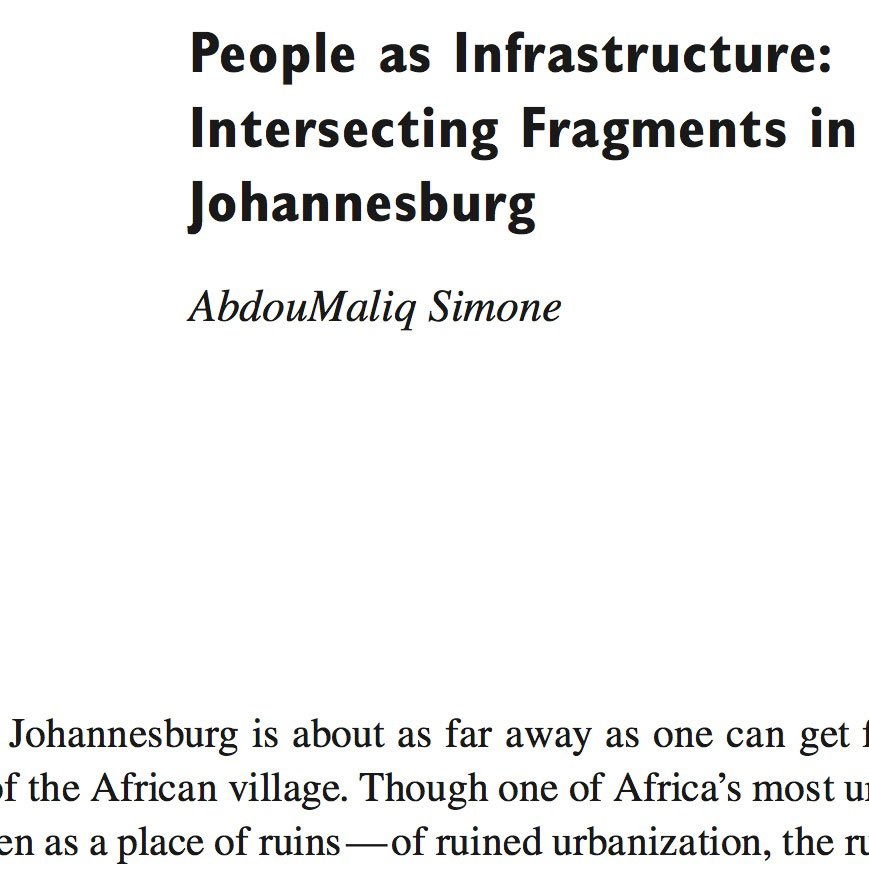
A few of us working at the intersection of data, civicmedia and citizenship are taking a look at this article by AbdouMaliq Simone. Some rambling comments follow:
First, just a short point about style: I’m delighted to see Simone’s unapologetic use of rich descriptions of Jo’berg’s streets. They are in striking contrast to what I see to be the standard ethnographic account in HCI papers. What I find tedious is the usual preamble in HCI works—explaining method—and then the use of participants’ quotes as a kind of ‘proof’ of particular points. Also, both point to a curious idea of what it means to demonstrate evidence or proof. Simone bothers with none of this. He gets straight to the stories, to the rich descriptions of inner city Jo’berg and its underbelly. (more…)
Talk at “Austerity Futures?”
Abstract for upcoming talk at Austerity Futures? seminar 4.
 [Big] data futures, from the street.
[Big] data futures, from the street.
Stories about big data are everywhere. We’re being told how significant the impact of big data will be on our lives by all kinds of people in the know. And yet I’ve been grappling with what (big) data might really mean to people who aren’t fully signed up members of the digerati, those shapers, makers and moders of technological futures. I’ve pondered, in short, on two simple questions: how does data matter to ‘people on the street’, and how might they want it to matter. In this talk, I’ll reflect on a project we’ve been building up at Microsoft Research to begin working through these questions. I want to discuss our efforts to ground a technological imaginary in ordinary life or, to put it another way, to enable a productive re-imagining of ‘big data futures’—to coin a phrase—from ‘the street’. I’ll describe how we’ve taken this challenge quite literally. Just over three weeks ago we began working with one street in Cambridge, Tenison Road. For at least a year, we plan to think through what data means for the Tenison Road community and in some cases to enable ways for the community to intervene in the future imaginaries. Although this won’t be a talk or for that matter a project about austerity, I certainly think it is one in which austerity and its repercussions will come to matter. My aim, then, will be to reflect on how this is a project concerned with futures, futures that are heavily concentrated in the minds of the technological elite, but also some that are more pedestrian that might just offer alternative possibilities for what (big) data could mean and what we might do with it.
web: tenisonroad.com | email: [email protected] | twitter: @tenisonroad
IOT on Claude Lévi-Strauss
Talk at INCITE-ing Transformation in Social Research
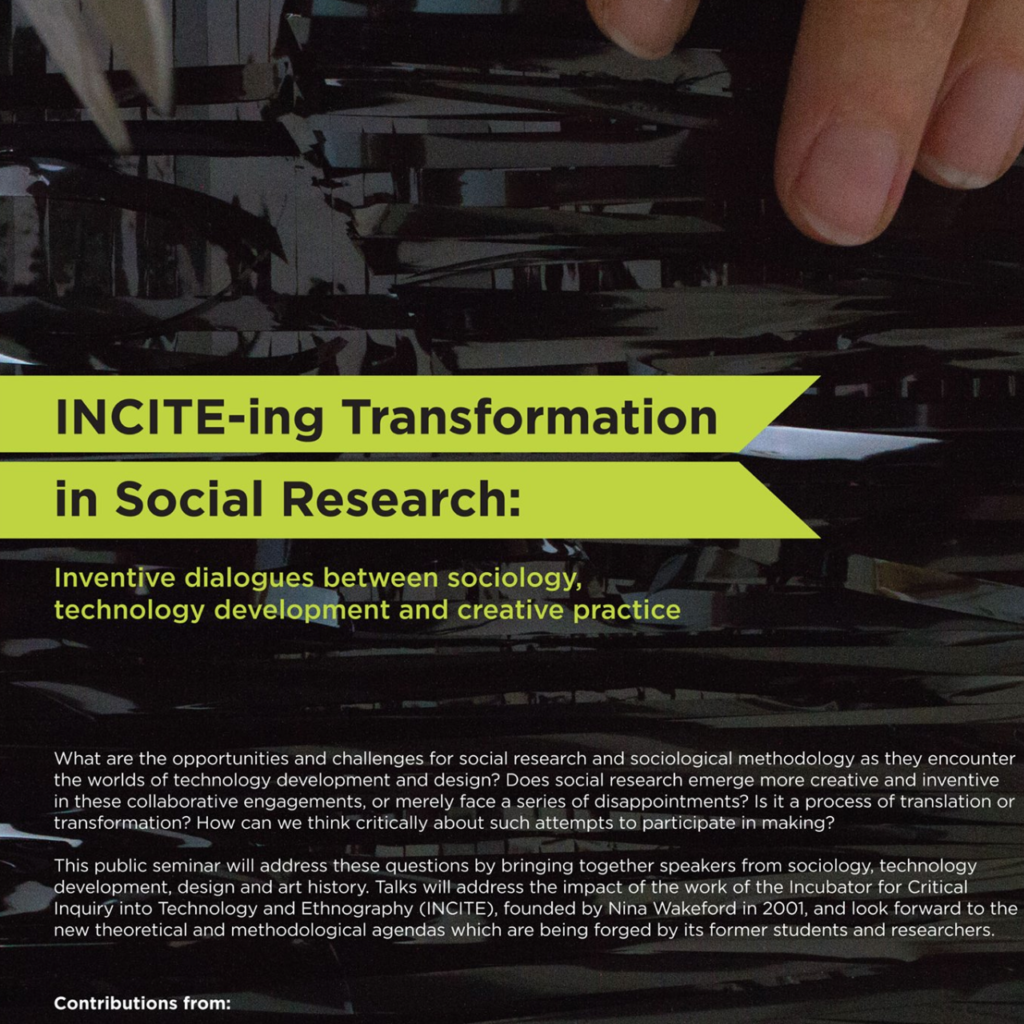
On Saturday (12 Oct) I presented a short paper reflecting on INCITE’s achievements over the last 10 or so years at “INCITE-ing Transformation in Social Research”
Preamble
Referencing her New Media’s Intermediaries article, I want to glimpse back to reflect on how Nina Wakeford positioned INCITE and made sense of it against a back drop of cultural theory, science and technology studies, CSCW and sociology
.. And, in doing this, I also want to peer forward, to consider what troubles there might be ahead, and what productive possibilities we might imagine for ourselves. (more…)
Short note on Solove’s ‘Nothing to Hide’

Some early thoughts on data and privacy, thinking with Solove’s Nothing to Hide:
Early on in his 2011 book, Nothing to Hide, Daniel Solove makes a provocative claim. He writes:
“Legal and policy solutions focus too much on the problems under the Orwellian metaphor—those of surveillance—and aren’t adequately addressing the Kafkaesque problems—those of information processing” p.26
Solove’s point here is that much of the legal wranglings and policy making surrounding privacy are based on the premise that people have something to hide. Thus the aims have, by and large, been tied to securing protections against surveillance—operating within the rubric of an “Orwellian metaphor”.
The broader argument Solove makes is that this treatment of privacy is missing the proverbial trick. As a concept, privacy doesn’t simply entail people wanting to hide things. For starters, according to Solove, “[m]any people don’t care about concealing the hotels they stay at, the cars they own, or the kind of beverages they drink.” p.25 “[M]uch of the data gathered in computer databases isn’t particularly sensitive, such as one’s race, birth date, gender, address, or marital status.” P.25
It isn’t so much the gathering of information that matters, Solove contends. It’s what agencies like governments are doing with it—the “information processing”—that counts. The allusion is to a Kafkaesque world in which the relations between agencies and individuals are managed and controlled through the analysis of information or data. The power, so to speak, is held by those who can both access the data and subject it to sophisticated analysis. I take this use of information processing to be analogous to big data analytics and certainly most of the examples Solve refers to support this.
I don’t know what Solove’s sources are for suggesting “most people” don’t care about the content of the information being gathered about them (this recent Guardian article appears to confirm this). I do get his broader point though. Certainly, it’s limiting to see privacy as exclusively based on the premise that people have something to hide. Moreover, the possibilities big data analytics open up for discovering some pretty personal things about people do seem daunting, if perhaps over-hyped.
Yet, without wanting to discount Solove’s argument, I want to propose a different way of thinking about this issue of information processing. Seen from the ground up, we might also start to ask what people themselves want to say through their data and using analytics. When Solove writes about “most people” I think we need to begin thinking about what this actual means and if there are ways of making claims like this actionable. So, a counter to the “nothing to hide argument” could be that most people—given the knowledge and tools—have “something to say”. That is they may want to have some say over how their information is distributed, aggregated, analysed and interpreted and, ultimately, how it is productively put to work. This certainly won’t solve the multiple problems surrounding privacy, but it may at least redistribute the power and, in the process, give people some new ways of expressing themselves.
Oh, and as it happens, this question of how to enable people to have some sort of say and control over what gets done with their information is one of the motivations for the new project we’re ramping up in my group at Microsoft Research.
* A thank you to Jessa Lingel for pointing me to the first quote above from Solove.
Announcing Tenison Road launch
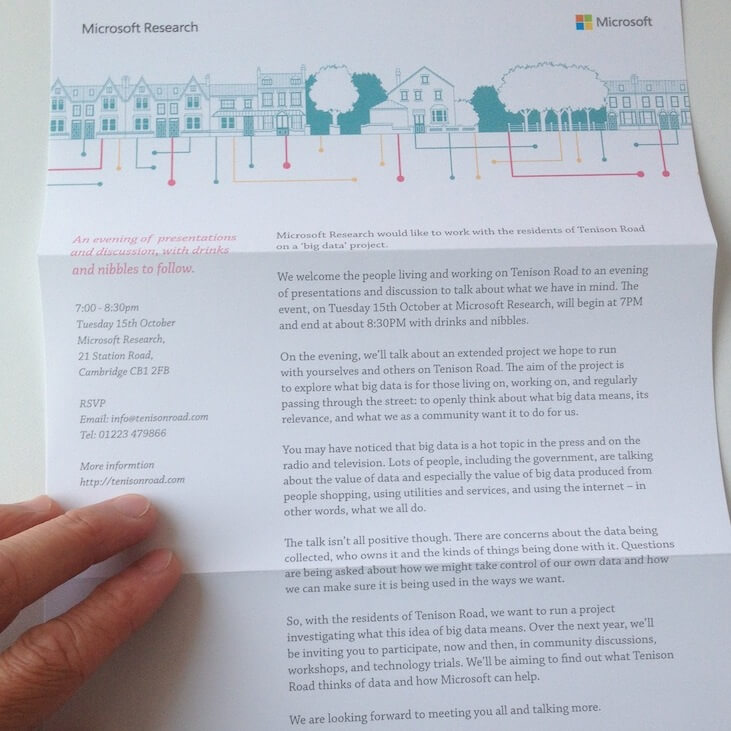
Finally posted some flyers to announce the launch of the big data project we’ll run for a year. We hope to work with the residents and proprietors on Tenison Road in Cambridge to better understand how big data matters and what people on the street want it to be. This is a project that is aiming to get at the interminglings of data and locality, and to intervene in the entanglements in productive ways. That’s the hope! … Fingers crossed.
2013 publications updated
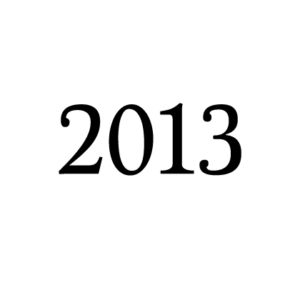
Updated 2013 publications.
Changes to FoI Act

Some significant changes to the UK’s Freedom of Information Act were enacted yesterday that give people to right to request and, critically, reuse data. It’s probably easy to overlook the implications of this. The way I see it, everyone (including commercial bodies) now have the right to access FoI regulated data and (re-)use it for analysis, analytics, building apps, etc. Whether that’s good or bad, it seems pretty profound to me. See a summary of the changes here on the Information Commissioner’s Office blog.
Short note on ‘Objects, Infrastructure and Vocation’
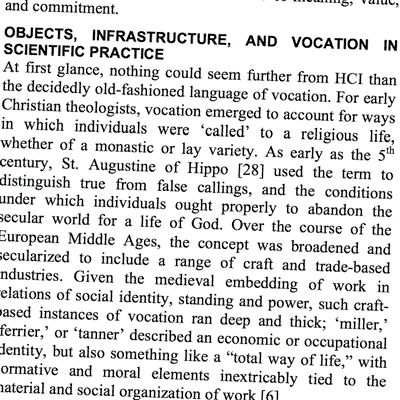
Infrastructure and Vocation: Field, Calling and Computation in Ecology
A brilliant CHI paper by Steven Jackson and Sarah Barbrow. How many papers presented at CHI cite St. Augustine of Hippo and, to boot, succeed in drawing out relevant reflections on scientific modelling tools in ecology. Seeing ecology through the lens of both infrastructure and the ‘vocational calling’ provides a productive view onto what ecologists do and how their practices are changing. Jackson and Barbrow illustrate this nicely by writing of the changing notion of ‘the field’ for ecologists. I see a strong parallel here between ecology and biology. Biology is a field very much in transition and the changes have much to do with the material encounters in biological work — with for example the changing nature of biologists’ work at ‘the bench’ and with experimental apparatus. The turn to machines, computation and algorithms is not only reshaping the practices but also refiguring what biologists know and how they see their phenomena (something we also tried to get across in At the interface of biology and computation at CHI). A similar conclusion is being drawn out in this papers as it captures the entangled relations between the tools, practices and ways of knowing in ecology.
Reading Haraway’s ‘Companion Species’

Reading, with delight, Donna Haraway‘s Companion Species. Small and pocketable, it travels.
On always already

The phrase “always already” is, in the main, attributed to the poststructuralist philosopher Jaques Derrida. It has, however, come to be a trope for the new materialists and it is in this usage that I modestly take it on. Specifically, my guiding sources are from the feminist technoscience scholars Donna Haraway and Karen Barad, both of whom make heavy use of the phrase to trouble the binaries abound in science and technology (subject-object, mind-matter, inside-outside, past-present, etc.).
For some back ground reading see The New Materialist “Always Already”: On an A‑Human Humanities.